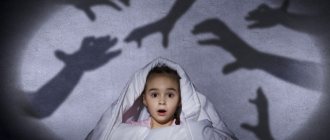Slava Profina 06/21/2018 no comments
1
Some people panic as night approaches. They are afraid to fall asleep, experiencing a feeling of anxiety. It seems to a person that as soon as he falls asleep, something terrible will happen, for example, he will have a nightmare or stop breathing. A constant or occasional fear of sleep is called somniphobia. The disorder is accompanied by severe mental and physical stress, insomnia and other symptoms.
Characteristic signs
From the outside it may seem that a person is experiencing slight anxiety, unfounded. Those who suffer from somniphobia are accustomed to receiving a lot of useless advice, because those around them are sure that anxiety before bed is a trifle that can be easily dealt with through willpower. Indeed, excessive suspiciousness is characteristic of some people, especially women, but true phobia has nothing in common with it. It usually starts with banal fear. The latter always has real reasons, for example :
- Fear that there will not be enough time for important things. A person worries, feels guilty about going to bed, although there is still so much to do. The result is insomnia and lost time.
- Fear of oversleeping. A responsible meeting, strict bosses, the need to catch a train, a plane - all this does not allow you to sleep, and even several alarm clocks set one after another with an interval of several minutes cannot save you.
- Fear of missing out on something important. This could be a long-awaited letter, message, notice of an event, or news. A person is afraid to leave the computer and go to bed, re-reading the same news or wandering aimlessly through websites until he exhausts himself.
- Feeling of defenselessness. A person loses the ability to fall asleep normally when he finds himself on a train, a hotel, or another house. A feeling of anxiety occurs when moving to a new home or on a business trip, when an unusual place does not seem safe enough. Over time, fear acquires an obsessive connotation and develops into a phobia.
- Scary dreams. Nobody likes to have nightmares. Naturally, the brain of a person who often dreams of them resists the need to fall asleep. Meanwhile, it is enough to give up some bad habits for dreams to become pleasant and calm. Watching TV, reading thrillers, computer games with elements of aggression and violence, a hearty dinner before bed - all this contributes to the brain giving out a portion of nightmares at night. Regardless of what a person dreams of in such a state, it will be accompanied by a feeling of horror and panic.
Fear of sleep is a phobia that always begins with mild anxiety. To avoid developing somniphobia or hypnophobia, you should pay attention to unpleasant symptoms in time and take measures to improve your condition.
Causes of insomnia
The loss of the ability to fall asleep quickly is not always due to fear. The reasons may be different, but in the absence of adequate measures, the result is always the same: a developed phobia. A person should pay attention to whether there are factors in his life due to which the body cannot bring itself into a relaxed and peaceful state necessary for sleep. Here are the ones that occur most often:
- Monotonous movements while traveling or at work. When a person travels on a train, works on an assembly line, sails on a steamship, or rides a horse for a long time, the body is adjusted to functioning in such conditions. And this happens quite quickly. Many people have noticed how well they sleep on a train or in a car. But then, when the brain stops feeling motion sickness, it is difficult for it to rebuild itself back.
- Vivid dreams. When a person sees too realistic images in a dream and remembers them after waking up, it is difficult for him to fall back to sleep, especially if the vision was nightmare.
- Strong impressions the day before. Positive and negative experiences have an exciting effect on the nervous system. The brain produces dream impulses, but because a person is tense, he does not fall asleep. Sleeping pills can help, but they have a short-term effect.
- Upcoming important events. A wedding, a move, negotiations, an exam, an interview - all this provokes active mental activity, albeit useless. A person endlessly scrolls through the same scenario in his head and cannot understand why the dream does not occur. The more important the event, the greater the tension.
- Unmet needs. Hunger, sexual arousal, thirst, and the desire to satisfy a gaming, tobacco or alcohol addiction interfere with sleep. The body is designed in such a way that sleep impulses are displaced by stronger needs. This explains bouts of insomnia in people who are trying to quit smoking or drinking alcohol.
Switch
The first piece of advice is for those who are afraid to sleep alone. Girls, there is nothing wrong with being alone at night. This happens to everyone. And it doesn't matter how old you are. Eleven or 45. Try not to think about fear, switch to some pleasant thoughts, you can think about your dreams, close your eyes and remember the past day, what it was like, what was good, what you liked, what you would like to do tomorrow. Such thoughts will help you switch from the problem of fear of sleeping alone and will calm you down.
Hypnophobia in neuroses
People suffering from neuroses usually have difficulty falling asleep.
They cope with the problem in different ways: some take medications, others practice auto-training, others do water procedures with relaxing extracts, decoctions and other supplements. All this gives only a weak and short-term improvement. The condition does not improve, only its symptoms are eliminated. Followers of Sigmund Freud believe that the cause of neurotic disorders lies in a special state of the ego. It does not allow you to fall asleep, because during sleep it will not be able to control the person’s state, as a result, unconscious desires may take possession of him. There is a psychological conflict, and usually the patient himself is not aware of it.
The pathological process is triggered by the brain in addition to desire, which is why people with somniphobia experience difficulties every time before going to bed. In some situations, there is a clear connection between the fear of nightmares and falling asleep. A stable connection is formed in the brain: if you don’t sleep, there will be no bad dreams.
The inability to control motor activity during sleep becomes a cause of fear for many. People who are prone to unconscious actions in their sleep are more likely than others to suffer from somniphobia. Frequent problems include enuresis, walking and talking in sleep, and masturbation.
Children are especially vulnerable to the situation. They know that urinary incontinence is bad, and if there is any embarrassment, the parents will be unhappy. Such a child will try his best not to fall asleep, so as not to lose control over the functions of the body. The result is neurosis, chronic sleep disorder , and in advanced cases, somniphobia.
A large group of people at risk are those who self-harm while unconscious. In the morning, they don’t understand where there are bruises, scratches, marks from scratching and pinching on their body.
Violence experienced in the past and not processed can also provoke the development of somniphobia. A person often dreams that they want to kill him, strangle him, beat him, tie him up, humiliate him, laugh at him, or mock him in some other way. When such nightmares are repeated regularly, a fear of falling asleep is formed, because dreams can be so real that the awakened person experiences physical symptoms. As a rule, these are shortness of breath, trembling, sweating or chills, pain in the arms and legs, tears, a lump in the throat and a state of horror.
Comfortable bed, comfort
If you are afraid to sleep alone, then you need to think, maybe the whole point is that you are uncomfortable and need to buy a comfortable bed? The bed, mattress and accessories should be clean and pleasant to your body. You should literally disappear into your bed. Be sure to pay attention to choosing high-quality devices for healthy sleep: go with your girlfriends to buy pillows, colorful blankets, comfortable orthopedic mattresses, update your bed to the maximum. Then all fears can be a thing of the past, you will simply dream of relaxing in these amenities.
Childhood fears
There are several groups of fears not caused by enuresis, which are more common in children, but in adults they develop relatively rarely and usually have a rational basis.
The strongest is the fear of death. It can develop after a tragic event, such as the death of a grandmother. The child begins to feel that if he falls asleep, he will end up dead or be considered dead. Children with developed imagination often suffer from frightening dreams after watching aggressive films or cartoons. Even good fairy tales can provoke the development of a pathological condition, because they contain insects, fantastic animals, and wizards. These characters are transformed by the subconscious into frightening images, and the child is afraid not only to fall asleep, but even to stay in a dark room. It is important for parents not to miss the moment when the first signs of a problem appear, otherwise it will be difficult to correct the situation later.
The peculiarity of children's thinking is such that dreams are inseparable from reality. The kid is sure: everything that scares him actually exists, but appears only when he is sleeping. Sometimes children begin to experience fear of something that actually exists, but frightened them in a dream. This could be anything from spiders to a chair, meaning the object is not necessarily aggressive or dangerous.
Help for mild distress
Chronic insomnia cannot be treated with sleeping pills, so it is important not to sit idly by, but to consult a specialist. Even if a person sleeps for the required amount of time under the influence of drugs, brain functions gradually deteriorate. This affects not only the psychological, but also the physical state. The consequences of somniphobia are chronic diseases, frequent headaches, pressure surges, heart problems and other disorders . If the fear of sleep appears rarely and is short-term, the following recommendations will help:
- Plan your working time. Avoid mental overload. Make a plan for the day, week and month, but include no more in it than is physically possible to do.
- Realize the value of rest. You can’t think that you can “get enough sleep” or “rest” later, but now there are more important things to do. Chronic lack of sleep and rest is not compensated for by anything, and it is often the cause of somniphobia.
- Don't sleep with the TV on. Mumbling gives a deceptive sense of security, but in fact, everything that the announcer says can transform into a nightmare. If you have to live alone, it is better to get a pet and equip the house so that no one else can get in.
- Do not sleep alone in someone else's apartment or house. At least avoid such situations.
In rare cases, you can take sleeping pills or sedatives, but do not overuse them. Addiction may occur, and then the dosage will have to be gradually increased, creating a load on the kidneys, liver and heart.
If all else fails, there is no need to postpone a visit to a specialist. There is nothing shameful about insomnia, and the task of a psychotherapist is to return a person to a normal state, and not to aggravate the current state. When it comes to hypnophobia (somniphobia), psychotherapy shows good results. A few sessions are enough to relieve the patient of anxiety, remove misconceptions and obsessive thoughts.
In severe cases, medications are prescribed, but usually they do not reach them. In addition to traditional treatment, a psychotherapist may recommend sports, yoga, meditation, or a relaxing hobby such as handicrafts.
Symptoms
Obsessive fear, anxiety about waiting for the night interfere with a normal state, lack of rest affects mental and physical health. As a result, psychological and physiological symptoms appear:
- anxiety in the evenings;
- feeling of helplessness;
- fear of dying in a dream;
- headache;
- cardiopalmus;
- feeling of lack of air;
- tremors and convulsions;
- increased sweating.
Symptoms depend on the psycho-emotional state and may increase or decrease spontaneously.
Due to lack of sleep, fatigue, irritability, constant drowsiness occur, heart disease worsens, libido and potency decrease. A person who lacks sleep becomes inattentive and irritable. Fear of sleep leads to exhaustion and metabolic disorders.











